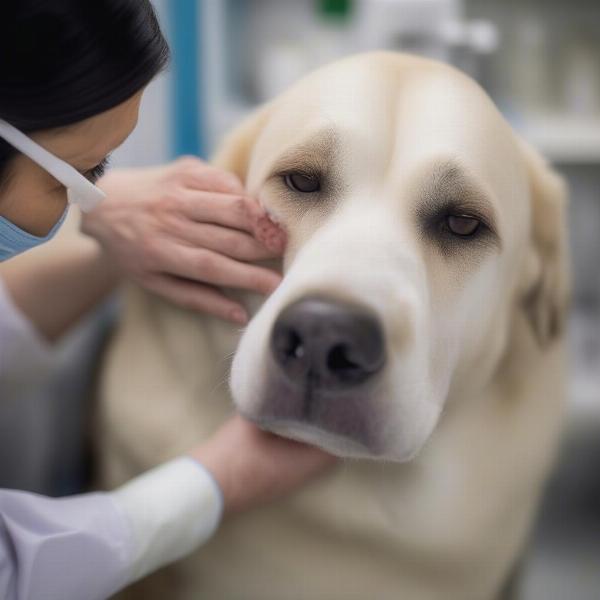Facial swelling in dogs can be alarming for any owner. It can range from mild puffiness to severe distension, indicating a variety of underlying issues, from allergic reactions to infections or even more serious conditions. Understanding the potential causes, recognizing the symptoms, and knowing when to seek veterinary care is crucial for your dog’s well-being.
Understanding Facial Swelling in Dogs
Swelling in a dog’s face occurs when fluid accumulates in the tissues. This can happen due to inflammation, trauma, or an underlying medical condition. While some cases of facial swelling are relatively minor and resolve on their own, others can be life-threatening and require immediate veterinary attention. It’s important to observe your dog closely for any accompanying symptoms and consult with your vet to determine the cause and appropriate treatment.
Common Causes of Facial Swelling in Dogs
Several factors can contribute to facial swelling in dogs. Some of the most common include:
- Allergic Reactions: These can be triggered by various allergens, including insect bites or stings, certain foods, medications, pollen, or environmental irritants.
- Infections: Bacterial or fungal infections can cause localized swelling in the face, often accompanied by redness, pain, and discharge. Abscesses, tooth root infections, and ear infections can all lead to facial swelling.
- Trauma: Injuries to the face, such as bites, blunt force trauma, or insect stings, can result in swelling, bruising, and pain.
- Dental Problems: Infected teeth or abscesses can cause significant swelling in the face, particularly around the jaw and cheeks.
- Tumors: While less common, tumors can also cause facial swelling. These may be benign or malignant and require veterinary diagnosis and treatment.
Recognizing the Symptoms
Facial swelling in dogs can manifest in various ways. You might notice:
- Puffiness around the eyes, lips, or muzzle
- Difficulty breathing
- Drooling
- Pawing at the face
- Hives or rash
- Lethargy
- Loss of appetite
When to Seek Veterinary Care
If you notice any swelling in your dog’s face, it’s essential to monitor them closely. While mild swelling may subside on its own, you should contact your veterinarian immediately if you observe:
- Difficulty breathing
- Severe swelling
- Hives or rash
- Lethargy or weakness
- Vomiting or diarrhea
- Signs of pain or distress
Diagnosing and Treating Facial Swelling
Your veterinarian will perform a thorough physical examination and may recommend additional diagnostic tests, such as blood work, urinalysis, or imaging (X-rays or ultrasound) to determine the underlying cause of the swelling. Treatment will depend on the diagnosis and may include:
- Antihistamines: For allergic reactions
- Antibiotics: For bacterial infections
- Antifungals: For fungal infections
- Pain medication: To manage discomfort
- Draining of abscesses: For localized infections
- Surgery: In cases of tumors or severe trauma
 Dog Receiving Veterinary Exam for Facial Swelling
Dog Receiving Veterinary Exam for Facial Swelling
Preventing Facial Swelling in Dogs
While not all causes of facial swelling are preventable, you can take steps to reduce your dog’s risk:
- Prevent exposure to known allergens: If your dog has allergies, avoid contact with the offending substances.
- Regular dental care: Brush your dog’s teeth regularly and schedule professional cleanings as recommended by your vet.
- Parasite prevention: Use flea and tick preventatives to minimize the risk of insect bites and stings.
- Monitor your dog’s environment: Be mindful of potential hazards that could cause trauma.
Conclusion
Swelling in a dog’s face can signal various health issues, some minor and others requiring immediate attention. By understanding the potential causes, recognizing the symptoms, and seeking timely veterinary care, you can help ensure your dog’s well-being and address any underlying medical conditions promptly. Don’t hesitate to contact your vet if you have any concerns about your dog’s health.
FAQ
- What should I do if my dog’s face suddenly swells up? Contact your veterinarian immediately.
- Can facial swelling in dogs be life-threatening? Yes, in some cases, particularly if it affects breathing.
- How can I tell if my dog’s facial swelling is due to an allergy? Look for other signs like hives, itching, and redness.
- Are certain breeds more prone to facial swelling? Some breeds with short noses (brachycephalic) might be more susceptible to certain types of facial swelling.
- Can I give my dog human antihistamines for facial swelling? No, never give your dog human medication without consulting your veterinarian. It could be harmful.
- How long does it take for facial swelling in dogs to go down? It depends on the cause. Some cases resolve within hours, while others may take days or even weeks.
- Can facial swelling in dogs be a sign of cancer? While less common, it can be a symptom of a tumor.
ILM Dog is your trusted resource for comprehensive dog care information. From breed selection and health to training and nutrition, we’re dedicated to providing expert advice and practical tips for dog owners worldwide. Whether you’re a seasoned dog owner or just starting your journey, ILM Dog offers valuable insights to help you provide the best possible care for your furry companion. For expert advice or further inquiries, contact us via email at [email protected] or phone at +44 20-3965-8624. We’re here to help you navigate every aspect of dog ownership with confidence.